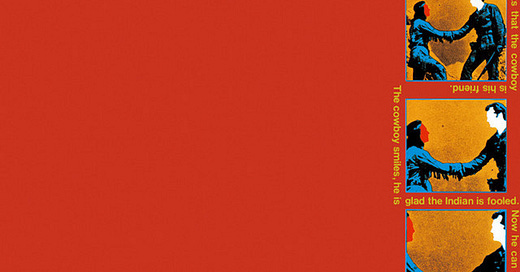Genre of the Day - Dance-Punk
Album of the Day - Entertainment! by Gang of Four (1979)
It is a season of goodbyes and sharp contrasts. The finality of endings reveals the starkness of time, yet also brings attention to how much there is to be grateful for in experiences passed by. I haven’t really had a chance to mention on this column—it’s been a while since an overtly mystical genre—but I dabble in reading tarot, mostly for fun but also because I think it’s a beautiful art and strangely grounding pastime. I just joined college radio and completed my intern semester learning the ropes, and will be granted my own regular show when I return from my semester overseas, but this week we had the opportunity to take a slot from open hours and do a show for finals. I want to do little tarot draws on my shows to set the overtones of them, and today I got the Hermit, a card indicating deep introspection and soul-searching. I’m excited to get to feel a little closer to music with some more free time now that this hectic season has let up, especially in contemplating the constant shifts and cycles life brings. Today’s genre seems to concur—let’s dance, but wild abandon is a futile wish.
Dance-punk’s story begins in the transition period between punk rock’s first explosion as it splintered into post-punk, and during a time mired by musical-cultural shifts—the Disco Demolition spelled popular dissatisfaction with one dominant sound, leading artists across genres to reinterpret danceability with avant-garde, out-of-the-box approaches. Perhaps dance-punk’s early artists were simply more inclined as dancers than some of their punk counterparts, attracting them to the rhythms of funk and disco while sustaining their punk ethos. The genre continued a pattern of a class of artists who threw off punk clichés and sidestepped squabblings over credibility, embracing divergent dance stylings.
Dance-punk favors rhythm over head-splitting riffs, tempering aggression even though the sound retains a cutting edge and oddball tendencies. Acts like Talking Heads, Defunkt, New Order, and Gang of Four led the way for the first stage of dance-punk in the turnover from the ‘70s to the ‘80s. As punk reentered the mainstream lexicon in the form of pop punk in the mid-2000s, dance-punk takes flourished amidst a new frontier of boundary-pushing electronic experimentation, manifest in the approaches of acts like LCD Soundsystem whose reincarnation has been all over music this year. So dance-punk tends to re-replicate itself, like a chain reaction of highly active fission.
Gang of Four never sacrifices the confrontational spirit of punk in their dual motive to groove, proving the coexistence of critique and the circus of dance music. Dubby horns, pungent, cutthroat guitar stabs, and a strong bass groove create a foreboding sense of movement on “Ether,” holding the listener captive. “Natural’s Not In It” throws the listener off yet again with its unconventional syntaxes (“Natural is not in it / Your relations are of power”), and critique of commodification. The frantic guitar of “Guns Before Butter” seems to want to escape the confines of its composition, just as the narrative wavers and craves escape from militaristic domination. The album’s funniest, most sardonic moment is “At Home, He’s A Tourist,” a riveting and universal story of dysfunction, deceit, and alienation: “He fills his head with culture / He gives himself an ulcer.” Dance, but never let your guard down: looking deeper than momentary pleasure is always a resonant message.




